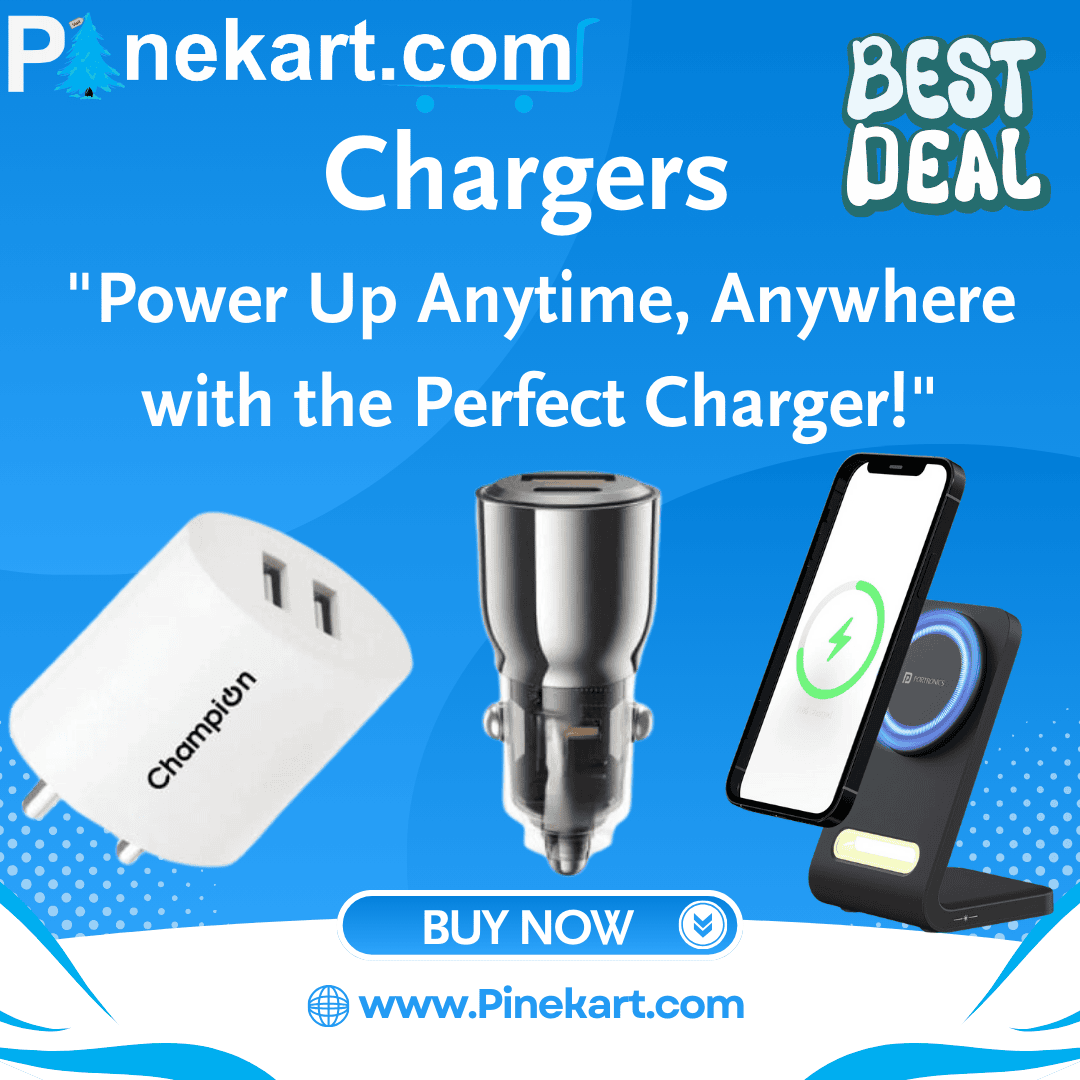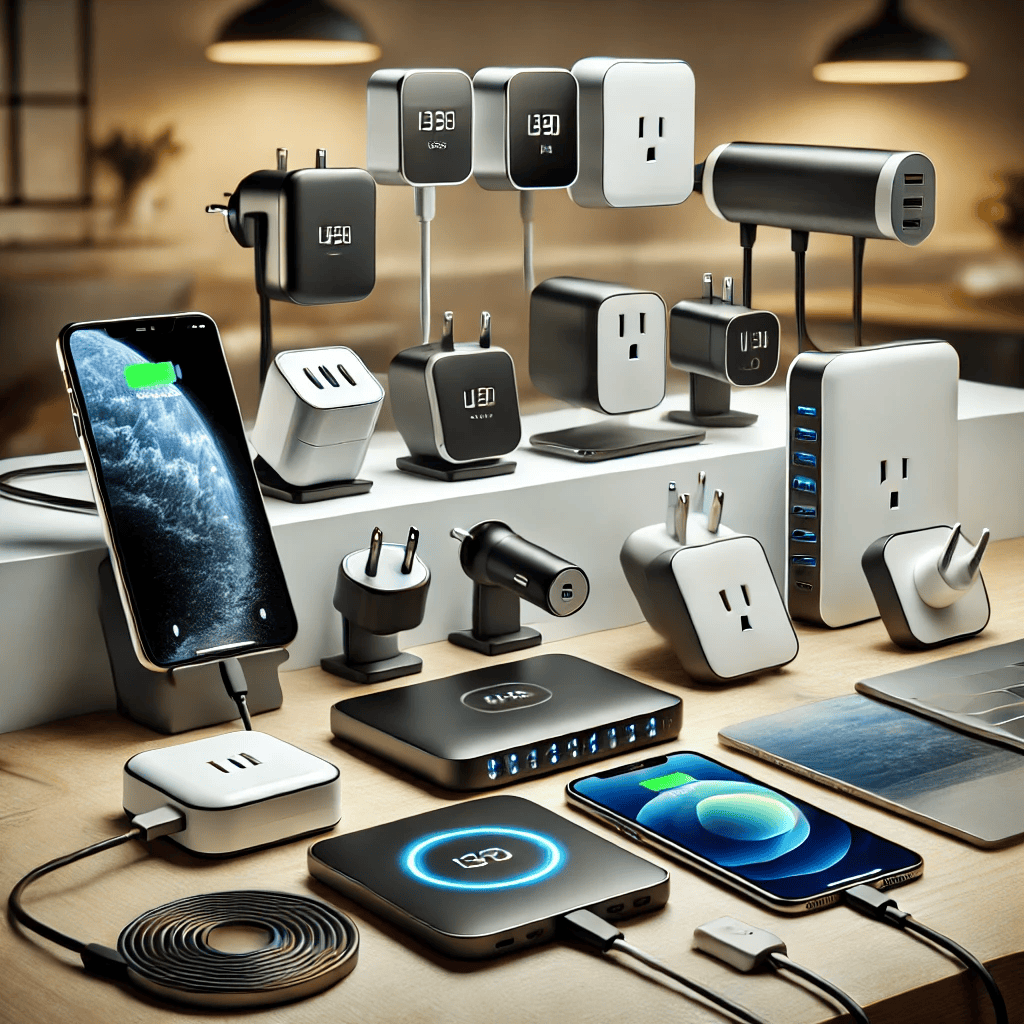In today’s tech-driven world, a charger is an essential accessory for keeping our devices powered. Whether it’s a smartphone charger, laptop charger, wireless charger, or fast charger, selecting the right one is crucial for device longevity and efficient charging.
Types of Chargers
Types of Chargers
1. Wired Chargers
These are the most common types, including:
- USB-C Charger – Used for most modern Android smartphones, MacBooks, and other gadgets.
- Lightning Charger – Exclusive to Apple devices such as iPhones and iPads.
- Micro-USB Charger – An older standard still used in some devices.
- Laptop Charger – Includes brands like Dell, HP, Lenovo, and MacBook chargers.
2. Wireless Chargers
A wireless charger eliminates the need for cables by using Qi technology. These chargers are compatible with iPhones, Samsung Galaxy, and other Qi-enabled smartphones.
3. Fast Chargers
A fast charger delivers more power, reducing charging time significantly. Common types include:
- Qualcomm Quick Charge – Used in many Android smartphones.
- USB Power Delivery (USB-PD) – Found in iPhones, MacBooks, and iPads.
- 65W & 100W Chargers – Ideal for laptops, tablets, and fast-charging phones.
4. Car Chargers
A car charger is useful for charging devices while driving. It connects via the 12V cigarette lighter socket or USB ports in modern cars.
Features to Consider When Buying a Charger
Features to Consider When Buying a Charger
1. Charging Speed
A good charger should support fast charging without overheating the device. Look for Power Delivery (PD) or Quick Charge (QC) support.
2. Compatibility
Ensure the charger supports your device’s voltage and wattage. For example, a MacBook charger won’t work with a Samsung laptop charger due to different power requirements.
3. Portability
If you travel frequently, consider a compact, lightweight charger. Some multi-port chargers allow you to charge multiple devices simultaneously.
4. Safety Features
Look for chargers with:
- Overvoltage Protection
- Overheat Protection
- Short Circuit Prevention
5. Cable Quality
Poor-quality cables can lead to slow charging and even device damage. Use certified cables like MFi-certified cables for Apple devices and USB-IF certified cables for other brands.
Best Chargers for Different Devices
Best Chargers for Different Devices
1. Best Charger for iPhones
- Apple 20W USB-C Power Adapter – Fast charges iPhones & iPads.
- Anker Nano 30W USB-C Charger – Compact and efficient.
2. Best Charger for Android Phones
- champion 25W Super Fast Charger – Supports USB-PD and PPS charging.
3. Best Charger for Laptops
- Apple USB-C Power Adapter – Best for MacBook Pro.
- Dell 65W Laptop Charger – Ideal for Dell laptops.
4. Best Wireless Chargers
- Champion – Compatible with iPhones & Android phones.
Frequently Asked Questions (FAQs)
Frequently Asked Questions (FAQs)
Q1: What is the best charger for fast charging?
A USB-C PD charger with at least 18W for phones and 65W+ for laptops is ideal for fast charging. Look for brands like Champion, Apple, Samsung, and UGREEN.
Q2: Can I use any charger for my phone?
No, using an incompatible charger can damage your device. Always check wattage, voltage, and amperage ratings before use.
Q3: Are wireless chargers slower than wired chargers?
Yes, wireless chargers are typically slower than wired fast chargers, but MagSafe chargers for iPhones and Qi-certified chargers are improving speed.
Q4: How do I know if a charger is safe?
Look for safety certifications like CE, FCC, UL, or BIS, which ensure overcharge protection and short circuit prevention.
Q5: Can I use my laptop charger for my phone?
If your laptop charger supports USB-PD (Power Delivery), you can use it for a phone. However, ensure the power output matches your device requirements.
Q6: What is the difference between USB-C and USB-A chargers?
- USB-C chargers support fast charging and higher power delivery.
- USB-A chargers are older and usually offer slower charging speeds.
Q7: Why does my charger heat up while charging?
A charger may heat up due to high power output, poor-quality cables, or prolonged usage. Ensure your charger has heat dissipation features.
Q8: How can I extend my charger’s lifespan?
- Avoid overcharging and frequent plugging/unplugging.
- Store it in a cool, dry place.
- Use high-quality cables.
Q9: Can I leave my charger plugged in all the time?
It’s safe if your charger has auto shut-off features, but unplugging when not in use helps save energy and reduces wear & tear.
Q10: Do all chargers work with all devices?
No, different devices require different power ratings. Using an incorrect charger can result in slow charging or device damage.


